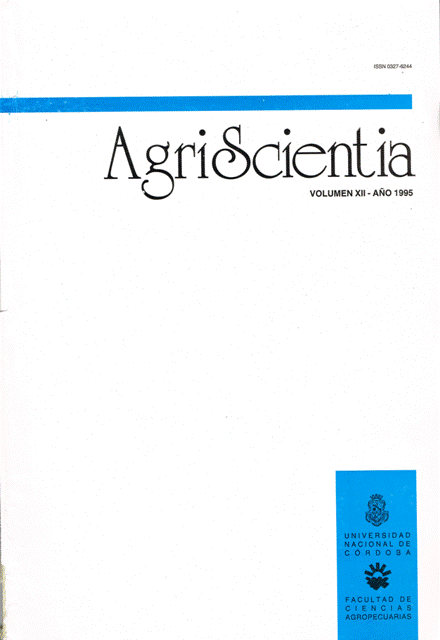Exudados radicales de alfalfa (Medicago sativa L.) en condiciones de estrés salino. Expresión de genes nod en Rhizobium
Contenido principal del artículo
Resumen
El estrés salino puede interferir con la transcripción de los genes de nodulación (nod) en Rhizobium al modificar la composición de los exudados radicales o la respuesta de las rizobias. Se recolectaron exudados de raíces de alfalfa (Medicago sativa L.) crecidas en NaCl al 0,5% durante 6 días y se analizaron mediante cromatografía en capa fina (TLC). La inducción de la transcripción de los genes nod de rizobias se llevó a cabo utilizando un vector de expresión con la fusión nod-lacZ. Los resultados indican que los perfiles de exudados de las plantas tratadas difieren en el tiempo con respecto a los controles, y que este retardo inducido por la concentración salina no afecta la capacidad inductora de los genes nod.
Detalles del artículo

Esta obra está bajo una licencia internacional Creative Commons Atribución-CompartirIgual 4.0.
Cómo citar
Referencias
Al-Rashidi, R.K., T.E. Loynachan, & L.R. Frederick. (1982). Desiccation tolerance of four strains of Rhizobium japonicum. Soil Biology and Biochemistry, 14, 489–493.
Andrés, J.A. (1994). Informe final Beca Formación 2º Nivel del Consejo de Investigaciones Científicas y Tecnológicas de la Provincia de Córdoba (CONICOR).
Aurag, J., & A. Sasson. (1992). Tolerance of Rhizobium leguminosarum by phaseoli to acidity and drought. World Journal of Microbiology and Biotechnology, 8, 532–533.
Chen, H., A.E. Richardson, & B.G. Rolfe. (1993). Studies of the physiological and genetic basis of acid tolerance in Rhizobium leguminosarum by trifolii. Applied and Environmental Microbiology, 59, 1798–1804.
CIAT. (1988). Manual de Métodos de Evaluación, Selección y Manejo FBN. Proyecto Especial CIAT, Centro Internacional de Agricultura Tropical, Cap. 9, pp. 5. Colombia.
Gaetano-Anollés, G., D.K. Christ-Estes, & W.D. Bauer. (1988). Chemotaxis of Rhizobium meliloti to the plant flavone luteolin requires functional nodulation genes. Journal of Bacteriology, 170, 3164–3169.
Graham, P.H., G. Ocampo, L.D. Ruiz, & A. Duque. (1980). Survival of Rhizobium phaseoli in contact with chemical seed protectants. Agronomy Journal, 72, 625–627.
Hartwig, U.A., C.A. Maxwell, C.M. Joseph, & D.A. Phillips. (1989). Interaction among flavonoid nod gene inducers released from alfalfa seeds and roots. Plant Physiology, 91, 1138–1142.
Hartwig, U.A., C.A. Maxwell, C.M. Joseph, & D.A. Phillips. (1990). Chrysoeriol and luteolin released from alfalfa seeds induce nod genes in Rhizobium meliloti. Plant Physiology, 92, 116–122.
Hartwig, U.A., C.M. Joseph, & D.A. Phillips. (1991). Flavonoids released naturally from alfalfa seeds enhance growth rate of Rhizobium meliloti. Plant Physiology, 95, 797–803.
Howieson, J.G., A.D. Robson, & L.K. Abbott. (1992). Acid-tolerant species of Medicago produce root exudates at low pH which induce the expression of nodulation genes in Rhizobium meliloti. Australian Journal of Plant Physiology, 19, 287–296.
Hungria, M.A., C.M. Joseph, & D.A. Phillips. (1991). Anthocyanidins and flavonols, major nod gene inducers from a black-seeded common bean (Phaseolus vulgaris L.). Plant Physiology, 97, 751–758.
Kosslak, R.M., R. Bookland, J. Barkei, H.E. Paaren, & E.R. Appelbaum. (1987). Induction of Bradyrhizobium japonicum common nod genes by isoflavones from Glycine max. Proceedings of the National Academy of Sciences USA, 84, 7428–7432.
Marenco, R.A., N. Fernandes Lopes, & P.K. Mosquim. (1993). Nodulation and nitrogen fixation in soybeans treated with herbicides. Revista Brasileira de Fisiologia Vegetal, 5, 121–126.
Martensson, A.M. (1992). Effects of agrochemicals and heavy metals on fast-growing rhizobia and their symbiosis with small-seeded legumes. Soil Biology and Biochemistry, 24, 435–445.
Maxwell, C.A., U.A. Hartwig, C.M. Joseph, & D.A. Phillips. (1989). A chalcone and two related flavonoids released from alfalfa roots induce nod genes of Rhizobium meliloti. Plant Physiology, 91, 842–847.
Maxwell, C.A., & D.A. Phillips. (1990). Concurrent synthesis and release of nod-gene-inducing flavonoids from alfalfa roots. Plant Physiology, 93, 1552–1558.
Michiels, J., C. Verreth, & J. Vanderleyden. (1994). Effects of temperature stress on bean-nodulating Rhizobium strains. Applied and Environmental Microbiology, 60, 1206–1212.
Miller, J. (1972). Experiments in Molecular Genetics. Cold Spring Harbor Laboratory Press: Cold Spring Harbor, N.Y., pp. 352–355.
Mohammad, R.M., M. Akhavan-Kharazian, W.F. Campbell, & M.D. Rumbaugh. (1991). Identification of salt- and drought-tolerant Rhizobium meliloti strains. Plant and Soil, 134, 271–276.
Peters, N.K., J.W. Frost, & S.R. Long. (1986). A plant flavone, luteolin, induces expression of Rhizobium meliloti nodulation genes. Science, 233, 977–980.
Peters, N.K., & S.R. Long. (1988). Alfalfa root exudates and compounds that promote or inhibit induction of Rhizobium meliloti nodulation genes. Plant Physiology, 88, 396–400.
Phillips, D.A., & S.M. Tsai. (1992). Flavonoids as plant signals to rhizosphere microbes. Mycorrhiza, 1, 55–58.
Redmond, J.W., M. Batley, M.A. Djordjevic, R.W. Innes, P.L. Kuempel, & B.G. Rolfe. (1986). Flavones induce expression of nodulation genes in Rhizobium. Nature, 323, 632–634.
Rennie, R.J., & S. Dubetz. (1984). Effect of fungicides and herbicides on nodulation and N₂ fixation in soybean fields lacking indigenous Rhizobium japonicum. Agronomy Journal, 76, 451–454.
Revellin, C., P. Leterme, & G. Catroux. (1993). Effect of some fungicide seed treatments on the survival of Bradyrhizobium japonicum and on the nodulation and yield of soybean (Glycine max L. Merr.). Biology and Fertility of Soils, 16, 211–214.
Vincent, J.M. (1975). Manual Práctico de Rhizobiología. Editorial Hemisferio Sur, Buenos Aires, Argentina, Cap. 1, pp. 4–5.
Yueh, L.Y., & D.L. Hensley. (1993). Pesticide effect on acetylene reduction and nodulation by soybean and lima bean. Journal of the American Society for Horticultural Science, 118, 73–76.
Zaat, S.A.J., C.A. Wijffelman, H.P. Spaink, A.A.N. Van Brussel, R.J. Okker, & B.J.J. Lugtenberg. (1987). Induction of the nodA promoter of Rhizobium leguminosarum sym plasmid pRL1JI by plant flavones. Journal of Bacteriology, 169, 198–204.
Zaat, S.A.J., C.A. Wijffelman, I.H.M. Mulders, A.A.N. Van Brussel, & B.J.J. Lugtenberg. (1988). Root exudates of various host plants of Rhizobium leguminosarum contain different sets of inducers of Rhizobium nodulation genes. Plant Physiology, 86, 1298–1303.





